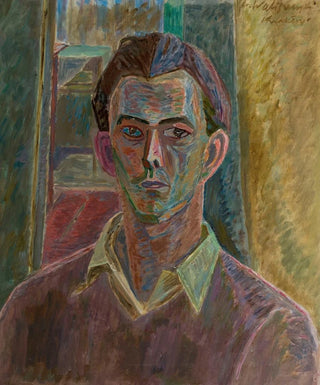Art print | Self-portrait (conflict of cases) - Zygmunt Waliszewski


View from behind

Frame (optional)
Autoportrait Art print (conflict of case) - Zygmunt Waliszewski – Engaging introduction
Art is often the mirror of the soul, a reflection of inner struggles and conflicts that inhabit the human mind. In this perspective, the work "Autoportrait (conflict of case)" by Zygmunt Waliszewski presents itself as a poignant exploration of the duality of being. This painting, both intimate and universal, invites the viewer to delve into the complex universe of the artist, where emotions, thoughts, and reflections on identity intertwine. The colors, shapes, and lines weave together to form a composition that transcends a simple self-portrait, offering a rich and nuanced vision of the human condition.
Style and uniqueness of the work
The originality of Waliszewski's work lies in its ability to capture the very essence of internal conflict. Through bold brushstrokes and a palette of vibrant colors, he manages to evoke feelings of tension and despair, while also revealing a glimmer of hope. The angular lines and distorted forms emphasize this struggle, creating a visual dynamic that draws the eye and stimulates the mind. Every element of the painting seems to dialogue with the others, forming a visual narrative that encourages reflection. By choosing to depict himself in a state of conflict, Waliszewski does not merely portray his image but also invites the viewer to question their own struggles and identities.
The artist and his influence
Zygmunt Waliszewski, an emblematic figure of contemporary art, has established himself through his unique vision and refined technique. His artistic journey is marked by an relentless quest for truth and authenticity, values that shine through in every work he creates. Influenced by the great masters of painting, he manages to combine tradition and modernity, thus offering a new perspective on universal themes. His introspective approach and commitment to exploring human identity make him an essential artist of our time. Through his works, he encourages us to reflect on our own existence, to question the multiple facets of our personality and to

Matte finish

View from behind

Frame (optional)
Autoportrait Art print (conflict of case) - Zygmunt Waliszewski – Engaging introduction
Art is often the mirror of the soul, a reflection of inner struggles and conflicts that inhabit the human mind. In this perspective, the work "Autoportrait (conflict of case)" by Zygmunt Waliszewski presents itself as a poignant exploration of the duality of being. This painting, both intimate and universal, invites the viewer to delve into the complex universe of the artist, where emotions, thoughts, and reflections on identity intertwine. The colors, shapes, and lines weave together to form a composition that transcends a simple self-portrait, offering a rich and nuanced vision of the human condition.
Style and uniqueness of the work
The originality of Waliszewski's work lies in its ability to capture the very essence of internal conflict. Through bold brushstrokes and a palette of vibrant colors, he manages to evoke feelings of tension and despair, while also revealing a glimmer of hope. The angular lines and distorted forms emphasize this struggle, creating a visual dynamic that draws the eye and stimulates the mind. Every element of the painting seems to dialogue with the others, forming a visual narrative that encourages reflection. By choosing to depict himself in a state of conflict, Waliszewski does not merely portray his image but also invites the viewer to question their own struggles and identities.
The artist and his influence
Zygmunt Waliszewski, an emblematic figure of contemporary art, has established himself through his unique vision and refined technique. His artistic journey is marked by an relentless quest for truth and authenticity, values that shine through in every work he creates. Influenced by the great masters of painting, he manages to combine tradition and modernity, thus offering a new perspective on universal themes. His introspective approach and commitment to exploring human identity make him an essential artist of our time. Through his works, he encourages us to reflect on our own existence, to question the multiple facets of our personality and to






